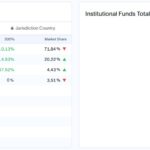In an emerging shift that could reshape the landscape of real estate finance, a recent report by the Deloitte Center for Financial Services highlights the burgeoning trend of real estate tokenization. Defined as the digital representation of physical assets using blockchain technology, this innovation is projected to revolutionize how properties are financed, owned, and traded, with the market potentially soaring to an impressive $4 trillion by 2035. This remarkable growth trajectory indicates a compound annual growth rate of 27% from its current valuation of under $300 billion.
The tokenization of real-world assets (RWA) marks a convergence of cryptocurrency technology and conventional financial practices, streamlining transactions in a way that could significantly lower costs and increase speed. With the power to automate intricate financial agreements, tokenization simplifies operations within the real estate sector. For instance, through platforms like Kin Capital’s $100 million real estate debt fund, automated coded rules manage ownership transfers and capital flows, demonstrating just one way these digital frameworks are being employed.
Deloitte’s report identifies three key areas of growth for tokenized property: private real estate funds, securitized loan ownership, and projects involving undeveloped land. Among these, the tokenized debt securities market is predicted to dominate, potentially reaching a value of $2.39 trillion. Meanwhile, private real estate funds could contribute around $1 trillion, and land development assets may add another $500 billion to the overall market.
“Despite the numerous advantages offered by tokenization, various challenges persist,” Deloitte cautions, highlighting issues related to regulation, asset custody, cybersecurity, and default scenarios that could impede progress.
As tokenization continues to capture attention within the real estate industry, it stands at the forefront of a financial evolution that promises to democratize investment opportunities and redefine property ownership for the digital age.

Impact of Real Estate Tokenization on Future Property Financing
Real estate tokenization is poised to revolutionize how property is financed, owned, and traded. Here are the key points that highlight its significance and potential impact:
- Rapid Market Growth:
- The market for tokenized real estate is projected to reach $4 trillion by 2035.
- Expected growth rate is 27% annually from its current size of under $300 billion.
- Definition and Mechanism:
- Tokenization involves creating digital representations of physical assets on blockchain.
- This technology merges crypto tech with traditional finance, enhancing accessibility and efficiency.
- Operational Benefits:
- Offers cheaper and faster settlements for real estate transactions.
- Brings transparency and automation to complex financial agreements.
- Three-Pronged Evolution:
- Private Real Estate Funds: Expected to contribute around $1 trillion by 2035.
- Securitized Loan Ownership: Predicted to dominate the market with a value of $2.39 trillion.
- Undeveloped Land Projects: Anticipated to account for $500 billion in value.
- Example of Successful Implementation:
- Kin Capital uses a $100 million real estate debt fund tokenization platform, Chintai, exemplifying successful tokenization.
- Challenges to Overcome:
- Regulatory hurdles pose significant challenges in the adoption of tokenized assets.
- Issues around asset custody, cybersecurity, and default scenarios need to be addressed.
As tokenization integrates into the real estate industry, it could lead to more democratized investment opportunities and reshape how individuals approach property ownership.
Real Estate Tokenization: A New Frontier in Property Financing
The growing interest in real estate tokenization marks a significant shift in how properties are financed, owned, and traded. According to a recent report by the Deloitte Center for Financial Services, this market could skyrocket to an impressive $4 trillion by 2035, fueled by a robust compound annual growth rate of 27%. This rising trend places tokenization at the confluence of emerging technologies and traditional finance, igniting debates among industry stakeholders.
Comparative Advantages: One of the defining features of tokenization is its ability to enhance operational efficiencies. By transitioning to a blockchain-based system, property transactions can benefit from faster settlements and reduced costs. This is particularly attractive for a sector often bogged down by complex agreements and lengthy approval processes. Tokens can encapsulate real-world assets, allowing for seamless investment in diverse portfolios, thereby broadening access to property investments for smaller investors who may have been shut out of traditional real estate markets.
Looking at recent developments in the industry, firms like Kin Capital are already harnessing tokenization for their real estate debt platforms, showcasing a tangible application of the technology. Such innovations not only illustrate the potential for increased liquidity but also pave the way for adaptive financial models that might better fit the needs of contemporary investors.
Comparative Disadvantages: However, despite the optimistic forecasts, the path to widespread adoption is not without its hurdles. Regulatory challenges loom large, as regulators worldwide grapple with integrating these novel financial services into existing frameworks. The issues surrounding asset custody, cybersecurity risks, and default scenarios cannot be overlooked, as they pose significant threats to the stability and trustworthiness of tokenized assets. Similar challenges have plagued other sectors embracing blockchain solutions, suggesting that the real estate space may encounter similar roadblocks that can hinder investor confidence and market growth.
Beneficiaries and Challenges: The primary beneficiaries of this tokenization trend are likely to be tech-savvy investors who value flexibility and transparency in their investments. Startups and forward-thinking corporations could leverage these innovations to gain a competitive edge, attracting capital more efficiently. However, traditional real estate firms may find themselves at a disadvantage if they fail to adopt or adapt to these new frameworks, risking obsolescence in a rapidly changing market. Additionally, existing investors should be cautious as they navigate the legal and technical landscapes that accompany tokenized assets, ensuring they remain compliant while exploring lucrative opportunities.
As real estate tokenization continues to gain traction, industry players must weigh both the groundbreaking potential and the inherent risks, shaping the future of how we perceive property ownership and investment.

















